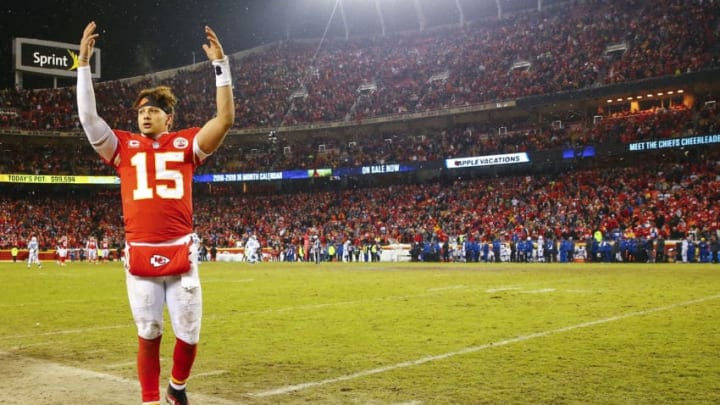
Why the Super Bowl window is wider for the Kansas City Chiefs
Talent Level:
Mahomes is much better than a lot of quarterbacks that get monster second deals. This isn’t Kirk Cousins, Ryan Tannehill, or Matthew Stafford getting the bag despite zero playoffs wins before or after their respective paydays. Mahomes has won in spite of his team’s deficiencies, while the others were given deals based more on projected production or fear of the unknown.
Mahomes led a team that fielded a historically porous defense to an overtime loss in the AFC Championship game against the New England Patriots. He simply needs less around him than others to be successful. To those who point to Hill and Kelce as security blankets, re-watch that AFC Championship Game. Mahomes is being pressured, the run game was shaky at best, and his primary looks are often covered… and the Chiefs still went out and scored 31 because of 15.
The Chiefs have their guy at quarterback, and that itself saves them from one of the most precarious positions for an NFL franchise: QB purgatory.
Quarterback Purgatory:
The conversation surrounding quarterbacks on rookie deals also involves, and often conflates, the issues of quarterback purgatory, something the Kansas City Chiefs will not face (but have plenty of experience with), so a slight digression. Average to slightly-above-average quarterbacks, often drafted highly, get substantial second deals because the market commands it. Or, as the Chiefs did for many years, veterans and journeymen are cycled through with middling success. (Best of luck with Joe, Denver.) Even these journeymen are able to command larger salaries. (cough, Mike Glennon, cough).
Additionally, coaching and management deeply invested in their quarterback selection are unable to back away from him, or not given the time or leash to do so. Often this average quarterback play is still enough to flirt with playoff contention, meaning high draft picks to land a successor are not available.
The rookie window closes leaving teams facing quarterback purgatory, unable to be decisive enough to cut ties, being overly hopeful for development, and sowing instability at all levels of the organization for years at a time. The best decision for the team is not necessarily the best for the team’s decision-makers.
The Chiefs, though heavily invested in Patrick Mahomes, face no such quandary. The stability of having your franchise quarterback and head coach in place cannot be underestimated.
Coaching:
The window to win undoubtedly shrinks when your franchise QB gets paid as such, but good coaching can counteract that to an extent. Andy Reid could take your local Pop Warner team to an 8-8 finish in the AFC West. He can certainly coach a team led by Patrick Mahomes, even one that has had to forgo one or two big re-signings, to multiple successful seasons. Let’s not forget, Alex Smith was commanding a large chunk of the salary cap for his entire tenure in Kansas City. The Chiefs posted a winning record in all five seasons, going to the playoffs four times. While not the top earner Mahomes will be, the cap predicament of a veteran quarterback is not new to current Chiefs coaches.
Age:
A final point, Mahomes is 23 and was drafted at 21. He left after only three years of college. While a team should never shy away from picking their “Quarterback of the Future” because he was a fifth-year senior (though Brandon Weeden was a stretch, Cleveland), Mahomes’ age is a small plus for the Chiefs.
For some context of how the age of draftees can be quirky, compare old friend Alex Smith and new enemy Joe Flacco. Drafted in the first round three years apart (2005 and 2008), the two are separated in age by only about eight months. Baker Mayfield, the 2018 number one pick, was already on the Texas Tech roster when Mahomes took his official visit as a high schooler. This only amounts to a 1-2 year difference in most cases, but with a generational quarterback those extra years are exceptionally valuable.
